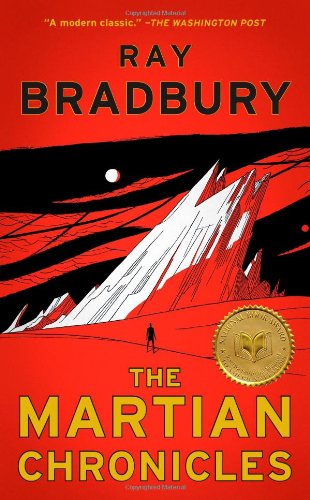 The Martian Chronicles (1950) by Ray Bradbury
The Martian Chronicles (1950) by Ray BradburyI've had quite the interesting experience with Ray Bradbury's writings. Of course, the first book of his I picked up was Fahrenheit 451, and I did that just 6 or 7 years ago (I know, I don't know how I went so long before reading it). Maybe I'd feel differently now, but at the time, I was underwhelmed by the story. The writing was nothing special, and the plot was only mildly interesting, though this might have been because I've been spoiled on Star Trek and SG-1 since I was a teenager.
Jump to about 5 years ago, and I was reading a wonderful anthology of sci-fi stories, when I came across Bradbury's piece, "Mars is Heaven!" Instantly, I reevaluated what I thought about him. "Mars is Heaven!" is bizarre and utterly fascinating- the kind of story that I'm always looking for and hoping some day in some universe to write.
Bradbury rose in my estimation, which is why, just a year ago, I read his gothic horror collection, The October Country. And now I understood what Bradbury was trying to get at in his novels and stories- he was looking for the uncanny, the weird, the inexplicable. He was fascinated by the convergence of reality and hallucination/ghosts/etc. At times, he becomes veritably poetic. Estimation: bumped up again.
Just a few days ago, I finished The Martian Chronicles, and aside from the fact that "Mars is Heaven!" is included in this collection of linked stories, I was figuratively knocked off my feet. Here, Bradbury imagines the beginning and end of human colonization of Mars, including interactions with the native inhabitants, and the conflicted feelings human settlers have toward Mars and Earth. We learn about missionaries trying to reach blue balloon-like Martians to tell them about Christianity. We hear about the dead Martian cities, the surreal, reddish-purplish landscape, the ways in which humans immediately try to turn the planet into their own versions of Earth. Bradbury captures the desolation, loneliness, silence, and even peace, of Mars, and each story is more brilliant than the previous one.
So have I made my case for why Bradbury was a genius? If you haven't read him before, do read The Martian Chronicles first. I intend to read every single thing he put down on paper. See you guys in a couple of decades.
Bradbury works better in short stories than he does in novels. And The Martian Chronicles is made up of a lot of short stories that share a common theme, which is why I think it works so well.
ReplyDeleteI re-read this a few years ago as an audio book, read by Bradbury. It was a great way to experience it in a different way.